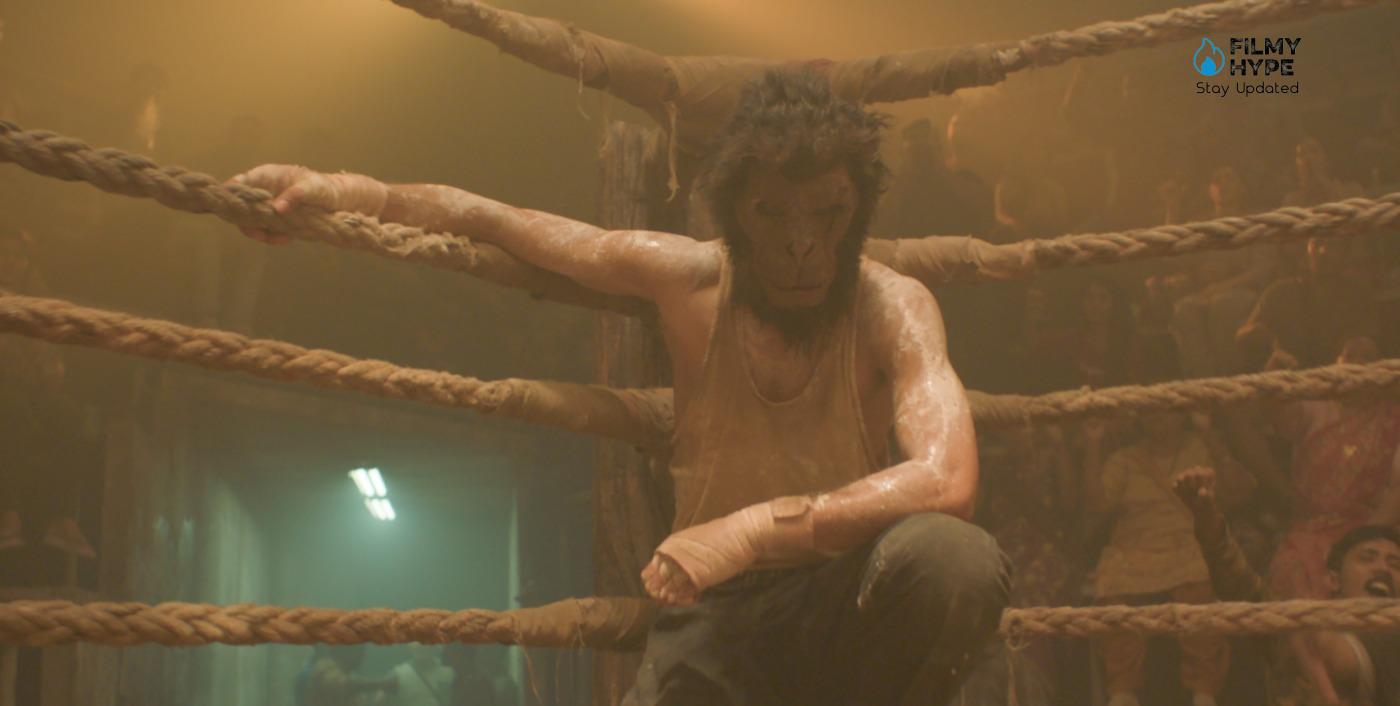Monkey Man Movie Review: Bloody Experience, Undoubtedly, Which Uses The Cinematographic
Cast: Dev Patel, Sharlto Copley, Sobhita Dhulipala, Brahim Chab, Sikandar Kher, Pitobash, Adithi Kalkunte, Vipin Sharma, Joseph J.U. Taylor
Director: Dev Patel
Where to Watch: In Theaters
Filmyhype.com Ratings: 4/5 (four stars)
Action, revenge movies, social criticism, and Bollywood mix in a single film, in cinemas from 4 April. Distributed by Universal Pictures, Monkey Man arrives in cinemas, the long-awaited directorial debut of Dev Patel, a face known to everyone since the days of Slumdog Millionaire who for the occasion steps behind the camera with a not exactly classic action thriller – inspired by the Indian legend of Hanuman – which sees him among the producers, together with Oscar winner Jordan Peele. In addition to being among the screenwriters, with Paul Angunawela and John Collee (Master & Commander: The Edge of the Sea), and among the protagonists, together with Sharlto Copley (District 9), Sobhita Dhulipala (Made in Heaven), Pitobash (Million Dollar Arm), Vipin Sharma (Mumbai Attack) and Sobhita Dhulipala.

Anger and the desire for revenge, therefore, are the primary ingredients of a cinematic experience in constant ferment, inexpressible with words, and extremely prolific through the images that compose it. Monkey Man is a film with multiple readings, concentrated on its objective and on a choreographic and violent immediacy that also leaves room for broader reflections, embracing all the possible faces of a profoundly problematic context that is difficult to accept both for us spectators and for the same protagonist. It is precisely in the revenge of the individual that the cinematic medium finds a completely personal voice that the other arts can never have, conveying disturbing messages and reflections both coherent with the ongoing story and well beyond its simplest dynamics.
Monkey Man Movie Review: The Story Plot
Monkey Man‘s story is as simple as ever. Starting from the traumatic events of a young man (played by Dev Patel himself), whose real name we don’t actually know beyond a fleeting identifier, the film builds one of the most classic revenge stories, finding his anger and voice in the past and current present on the big screen. Starting from the brutality of a disturbed protagonist, therefore, we find ourselves immersed in a narrative context that is difficult to fully understand and digest, moving hand in hand with the same subcutaneous restlessness of someone who always turns his gaze elsewhere, soiled by his own and very personal biographical story and from a large, alienating Indian metropolis.

Kid, this is the identifier mentioned before, earns his living in a sort of clandestine “Fight Club” in which he is paid to compete with thugs who are just as crazy as him, wearing a monkey mask every night. Immersing ourselves in the theatrical illegality of a context-driven by someone else, money becomes the only logical reason to justify the physical pain felt by the young man every evening. But his plans are very different, and that is only one of the wrinkles of a man determined to find his raison d’être elsewhere, exploiting the demons within him and the knowledge learned over the years to access a world far from dirt in the ring. Starting from the Hindu myth of Hanuman, the film shapes its most famous symbols within a story that makes its relevance a brutality from which it is not easy to escape. In the underlying narrative simplicity, therefore, we find a series of subtle, spiritual, and obvious references, totally consistent with the most direct and studied violence, in a journey of revenge with a flavor that is both graceful and unbridledly bloody.
Monkey Man Movie Review and Analysis
Monkey Man is first and foremost a melodious film, a real dance inspired by the progression of events and by a formal construction that certainly leaves its mark. It is precisely by talking about “structure” that we manage to find something interesting in a very simple narrative experience as a whole. Dev Patel consciously chooses to reduce the writing to a minimum, concentrating all the appeal of his feature film on direction, photography, soundtrack, action choreography, and underlying themes. In trying to keep up with the protagonist’s journey one becomes involved in the restless gaze of this ever-moving camera, always ready to move, to run after, to take on Kid’s gaze, to move away from him, and to follow him. transforming into a real character in his own right.

All the dynamism of Monkey Man derives precisely from its own direction and staging, giving the audience at the cinema a frenetic action beyond words and extremely violent, but still fresh and current (closely recalling the John Wick saga, for example, also mentioned directly in the narrative). In all this, we discover the great metropolis within which the story develops, soiled by its own daily reality and framed by a photograph that always maintains light and dark tones, almost a direct projection of the journey of the protagonist himself. As we move through the steep and dilapidated streets of this city, it is the shots that speak more about the ongoing story itself, focusing, even fleetingly, on a series of direct details that will certainly leave you speechless.
In the exasperating comparison between the most dramatic poverty and the wealth of those few who are at the top, Monkey Man poisons itself to the core, first of all telling the story of a precise context (from a social, economic, cultural, and political point of view), to then stain it with the blood of revenge that wants to find its way at all costs. In this, religion takes over and that very particular deviant spirituality soon becomes a manipulation and direct mask of the most typically human and individualistic evil. Nothing new or never seen before, obviously, but the impact of a thematic construction of this kind, worked in parallel with a symbolism specifically connected to Hindu mythology, attracts and strikes, outlining a fury that identifies its reasons and methods in a creative dimension with an impact beyond any doubt. It is not only the ferocious component of Monkey Man that attracts, but also above all the more cultural and formal one, linked both to the context in which everything moves and to the creative vision of a director who expresses himself through his own very personal voice.

In the simplest, most unbridled, and angry revenge, therefore, we also find dilemmas and deeply touching moments, but never in a banal way, enhancing something that could have turned out to be simple and obvious even with a very powerful and fundamental musical sector in the construction of one’s own creative and distinctive identity (the alternation between sounds distant from the West and the recognisability of some commercial motifs is successful). The images are the first to speak in Dev Patel’s debut feature film, it is they who leave us dismayed by the smallest and insignificant details, disorienting the gaze of the spectators who are overwhelmed by the narrative material in progress, and by a specific capable anger to break the same fictitious limits of a story with a voice that is difficult to contain, which screams, despairs and seeks difficult answers.
Which, as we were saying, is not free from notes, especially for the attempt to put too many irons in the fire, even in an atypical story – for our market or compared to the products we are used to – like this. Monkey Man is a story of revenge rather than revenge, in which social and civil issues support the main reason that animates the fighter with the monkey mask. A nobody, ready and used to doing the jobs that no one wants, to bleed and carry the signs of the pain felt, without hiding them, more due to the disinterest of others than anything else. A nobody who does not aspire to become someone, but rather to return power to the people, the disinherited, the pariahs, today victims of the Gig economy, trans, homosexuals and discriminated against of all sorts. And the influence of Indian roots is certainly strong, in a country where classes and divine rights are part of a thousand-year-old culture of generations, both in the attempt to restore dignity to certain categories and in the construction of certain fight scenes.
daughters of the cinema of more classic Bollywood, unfortunately at least in one case aped confusingly rather than rendered with the cunning that the 2022 RRR had shown us. The good Dev must have been harboring this desire for a long time, perhaps a certain anger, and he had gotten tired of playing “the Indian” in some way, and these are the consequences: a curious combination of clichés and personal instances, in which not always it is easy to maintain a balance, in which the rhythm is inevitably unequal, at times compressed, at times unsettling (especially in the central part, in which one ‘stumbles’ and which loosens the tension), often carried forward through juxtaposed images (which on the other hand help to avoid the damage done by the screenwriters of similar titles) or by the intervention of secondary characters, who in turn are made to emerge from the background without being particularly introduced or cared for.

Of course, not a story from which we ask for verisimilitude – although its ‘rebel’ soul drips with reality – but also for certain excesses bordering on the folkloric and an exaggerated visual care. This ensures that the Monkey Man never bleeds on his face despite prison beatings, always remaining charming and disheveled ad hoc, doesn’t even show a swollen eye after being hit by an iron club, or – in the canonical final half hour of ultraviolence – there is no one, in a structure full of security agents and bodyguards, who shoots the “terrorist” on duty. How is ours defined, not by chance, just to mention the ease with which those who go against the system, injustice, or common thought – in the film that of the supreme party – are branded and to add to others an implicit warning to avoid uniformity of thought, of vision, of rampant judgment.
Monkey Man Movie Review: The Last Words
Monkey Man is a film that uses the violent and studied action of revenge to scream more at the spectators at the cinema. A bloody experience, undoubtedly, which uses the cinematographic medium, wrapping itself in its formal coils almost entirely, and working with images and soundtrack to surprise and think on a broader spectrum. The result is a work that makes the intimacy of its protagonist a matter of cultural, political, linguistic, and religious reflection, always remaining coherent with itself. Monkey Man is a great acting debut, a revenge movie that brings to Hollywood a cruder, dirtier, nastier cinema than the increasingly stylized and stylish parable of John Wick. It remains a film with some important directorial limitations and narrative naivety. Dev Patel, however, passed with flying colors in his first such physical role, as a vigilante and fighter.







